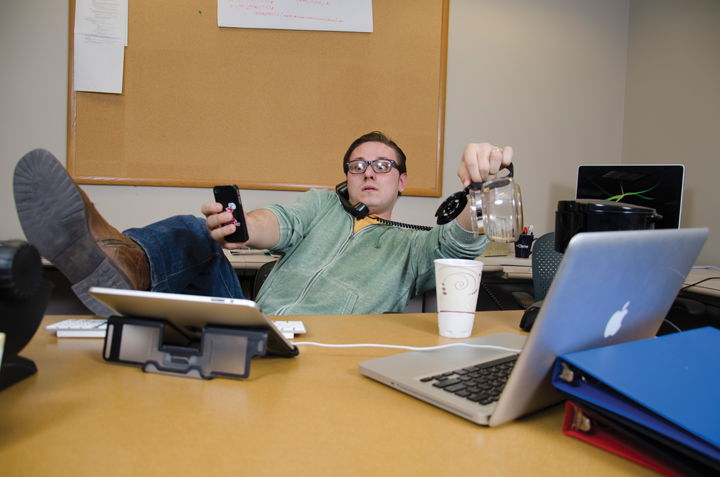Many living in today’s world know the feeling all too well: lots to do, not a lot of time. Technology claims it can help users organize and multitask more efficiently, but many accuse it of doing just the opposite.
“Multitasking doesn’t exist, it’s a myth,” Mark Humbert, professor of psychology at Sinclair Community College said. “What you’re actually doing is selectively focusing your attention on different tasks one at a time.”
The word multitasking was first used to describe the parallel processing abilities of computers. In recent decades, it has transformed to describe the human attempt to do as many things as possible, simultaneously and quickly.
“Some are better than others at shifting their attention,” Humbert said. “Its effectiveness often depends on the content of the communication.”
In some cases, the attempt to divide one’s attention can have negative effects, or can become a safety concern.
“Driving and texting is more dangerous than drunk driving,” Humbert said. “You’re constantly jumping back and forth from the text to the road.”
Students might relate more to the example of those who walk through the halls with their phones in hand.
“I’ve seen people texting and walking who run into doors or people, anything,” Sam McGee, a Computer Science major at Sinclair said. “It’s the worst when you’re stuck walking behind them.”
But if they’re texting and walking, isn’t that multitasking?
“It’s true, you’re walking and texting at the same time, but you’re not thinking about walking. That’s the difference,” Humbert said. “You look up occasionally to redirect your course, but again, the attention is simply shifting back and forth.”
Business major Steven Kohler sums it up differently.
“Sometimes I feel like I have to choose between doing three things at once, but doing them poorly, or concentrating on a single thing and doing it well,” he said. “It’s hard when I don’t have a lot of time.”
In the examples so far, technology hasn’t helped with multitasking, but has been the culprit — the reason we become distracted from a task in the first place. Which brings up an important point: isn’t technology supposed to help with multitasking?
“You may be doing more, but you’re getting less done,” Humbert said.
He refers to the three stages of memory, used by psychologists to understand how we process information.
“The first stage is sensory recognition. We take something in, though we may remember it for only 2.5 seconds. The second step is to pay attention to the sensory information you’re taking in,” Humbert said.
The second stage is our short-term memory. To reach the third stage, the information must be internalized and conceptualized, and is then added to our long-term memory, according to Humbert.
“The problem is, these days, we’re only reaching the first step,” he said.
When we shift our focus from task to task, we don’t give our brain the time or effort required to internalize the information, Humbert said. He mentioned students who shift their attention back and forth in class, from laptops to smartphones, then back again to the lecture.
“They’re taking snapshots of the lecture,” he said. “The quality isn’t there.”
Timothy Taylor, an undecided major, agrees.
“I used to take my laptop to class, I thought I could multitask, take notes … it didn’t work for me,” he said. “I’d always end up looking at the PowerPoint online later.”
Humbert admits technology, if used correctly, can help people organize their lives.
“Without my calendar app I’d be lost half the time,” he said.
When asked whether the distractions offered by current technology outweigh the benefits, he said it’s hard to tell.
“There needs to be more research on how we attempt to multitask, and how technology has helped or hindered,” he said.

